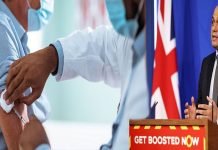Dominic Raab warns changes to lockdown restrictions will be ‘modest’
Speaking at a press conference Raab, who is standing in for Prime Minister Boris Johnson while he recovers from COVID-19, said the government’s scientific advice suggests it is necessary to extend the transition because the data is providing a “mixed and inconsistent picture,” with infections still likely to increase in some parts of the country.
Therefore ‘Lockdown restrictions’ in the UK will continue for “at least” another three weeks as it tackles the coronavirus outbreak, Dominic Raab has said.
The foreign secretary told the daily No 10 briefing that a review had concluded relaxing the measures now would risk harming public health and the economy.
“We still don’t have the infection rate down as far as we need to,” he said.
U.K. lockdown measures are more relaxed than many other countries, with people allowed to shop for food and to exercise outside once a day.
It comes as the UK recorded another 861 coronavirus deaths in hospital, taking the total to 13,729.
As of 5 p.m. on Wednesday, 13,729 people in the U.K. have died in hospital after contracting COVID-19, up by 861 on Tuesday. A total of 417,649 tests have been carried out in England, Wales and Scotland, with 103,093 positive results.
Polling suggests the British public is very supportive of an extension to the lockdown measures, though the government has been criticized for failing to outline an exit plan. Nine in 10 Brits said they support extending the lockdown measures for a further three weeks, according to a YouGov snap poll published Thursday, with 67 percent saying they strongly support an extension.
Mr Raab told the public today:”I’ve said it very clearly – there is no change in the rules today.
“What the PM will do is set out a roadmap with milestones, that can look to the future.
“The virus is not beaten yet – it remains deadly and infectious.
“We are working hard to bring it down in areas of concern.
“I am confident we can and we will do it.”
He refused to “jump the gun” and reveal what changes could come in the next few days.
Ministers are required by law to assess whether the rules are working, based on expert advice, every three weeks.
Mr revealed that the R rate of transmission is now somewhere between 0.5 and 0.9. Crucially it’s still below one so the virus is not transmitting it on to large numbers of people.
Boris Johnson’s’ roadmap will contain “milestones” which must be reached before any changes – and “detailed guidance” for the public and businesses into the new tweaks.
Some measures will be able to come in quickly but others will take longer, he stressed.
Strict limits on daily life – such as requiring people to stay at home, shutting many businesses and preventing gatherings of more than two people – were introduced on 23 March, as the government tried to limit the spread of coronavirus.
Mr Raab, deputising for Prime Minister Boris Johnson as he recovers from the illness, said: “There is light at the end of the tunnel but we are now at both a delicate and a dangerous stage in this pandemic.
“If we rush to relax the measures that we have in place we would risk wasting all the sacrifices and all the progress that has been made.
“That would risk a quick return to another lockdown with all the threat to life that a second peak to the virus would bring and all the economic damage that a second lockdown would carry.”
Mr Raab said the review concluded that the measures were working, but there was evidence the infection was spreading in hospitals and care homes.
He said five conditions needed to be met before the lockdown was eased:
- Making sure the NHS could cope
- A “sustained and consistent” fall in the daily death rate
- Reliable data showing the rate of infection was decreasing to “manageable levels”
- Ensuring the supply of tests and Personal Protective Equipment (PPE) could meet future demand
- Being confident any adjustments would not risk a second peak
He said he could not provide a definitive timeline, but said the prime minister’s warning at the outset of the epidemic that it would take about three months to come through the peak still applied.
“We know it is rough going. Every time I come to this lectern and read out the grim toll, I walk away and think of their sons and daughters going through this right now, their brothers, sisters, grandchildren, all those left behind,” Mr Raab said.
“It makes this government focus even harder on what we must do and I know together, united, we must keep up this national effort.”
With Labour calling on the government to publish plans for easing the lockdown, Mr Raab said they were being as “open as we responsibly can” but they could not “prejudge” the evidence that their scientific advisers would consider at the next review in three weeks’ time.
Labour leader Sir Keir Starmer said “the government is right” to extend the restrictions but he said any exit strategy would require mass testing in the community and it was “struggling” to reach its target of 100,000 tests a day by the end of April.
The UK now has the capacity to carry out 35,000 tests for coronavirus a day, Downing Street said, although the most recent figures showed they only carried out 18,665 in the last 24-hour period.
Sir Keir Starmer also told the BBC’s podcast Coronavirus Newscast that he suspected Mr Raab was “reluctant” to sign off an exit strategy without the prime minister in office.
Also speaking at the briefing, Sir Patrick Vallance, the government’s chief scientific adviser, played down suggestions that vulnerable groups such as the elderly could be kept under lockdown conditions for longer.
He said the aim was for “everything to start moving more towards normal, not to segregate certain groups”.
Support Independent Journalism Today
Our unwavering dedication is to provide you with unbiased news, diverse perspectives, and insightful opinions. We're on a mission to ensure that those in positions of power are held accountable for their actions, but we can't do it alone. Labour Heartlands is primarily funded by me, Paul Knaggs, and by the generous contributions of readers like you. Your donations keep us going and help us uphold the principles of independent journalism. Join us in our quest for truth, transparency, and accountability – donate today and be a part of our mission!
Like everyone else, we're facing challenges, and we need your help to stay online and continue providing crucial journalism. Every contribution, no matter how small, goes a long way in helping us thrive. By becoming one of our donors, you become a vital part of our mission to uncover the truth and uphold the values of democracy.
While we maintain our independence from political affiliations, we stand united against corruption, injustice, and the erosion of free speech, truth, and democracy. We believe in the power of accurate information in a democracy, and we consider facts non-negotiable.
Your support, no matter the amount, can make a significant impact. Together, we can make a difference and continue our journey toward a more informed and just society.
Thank you for supporting Labour Heartlands











